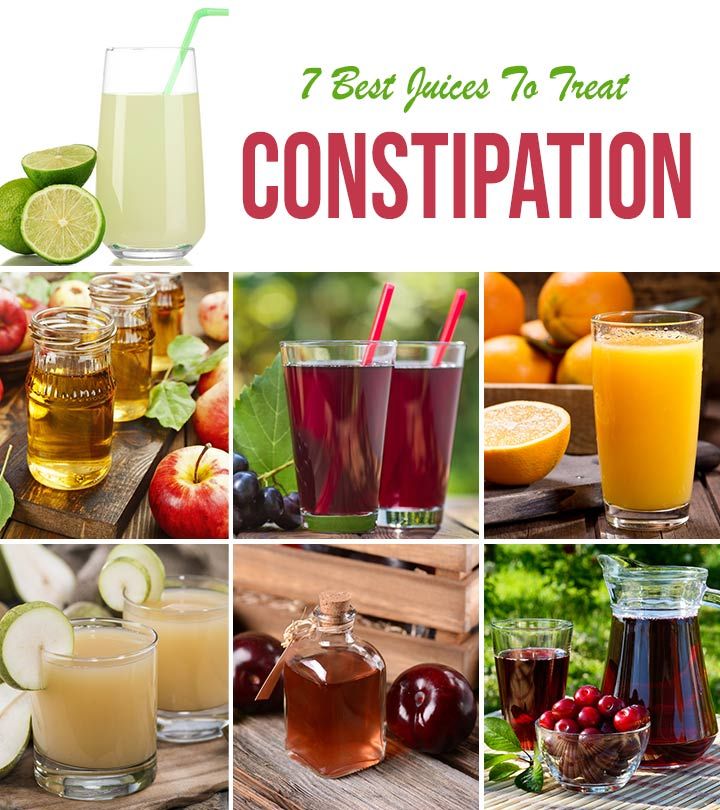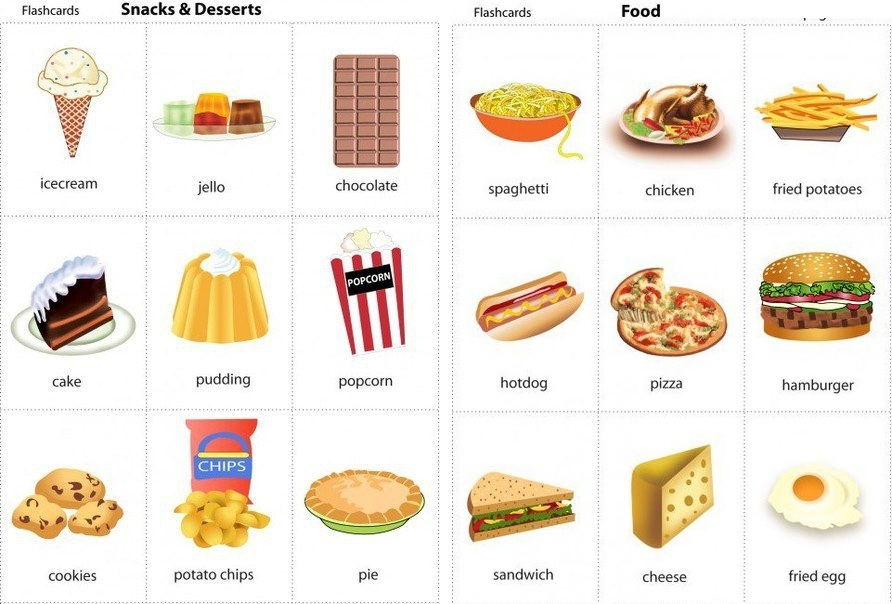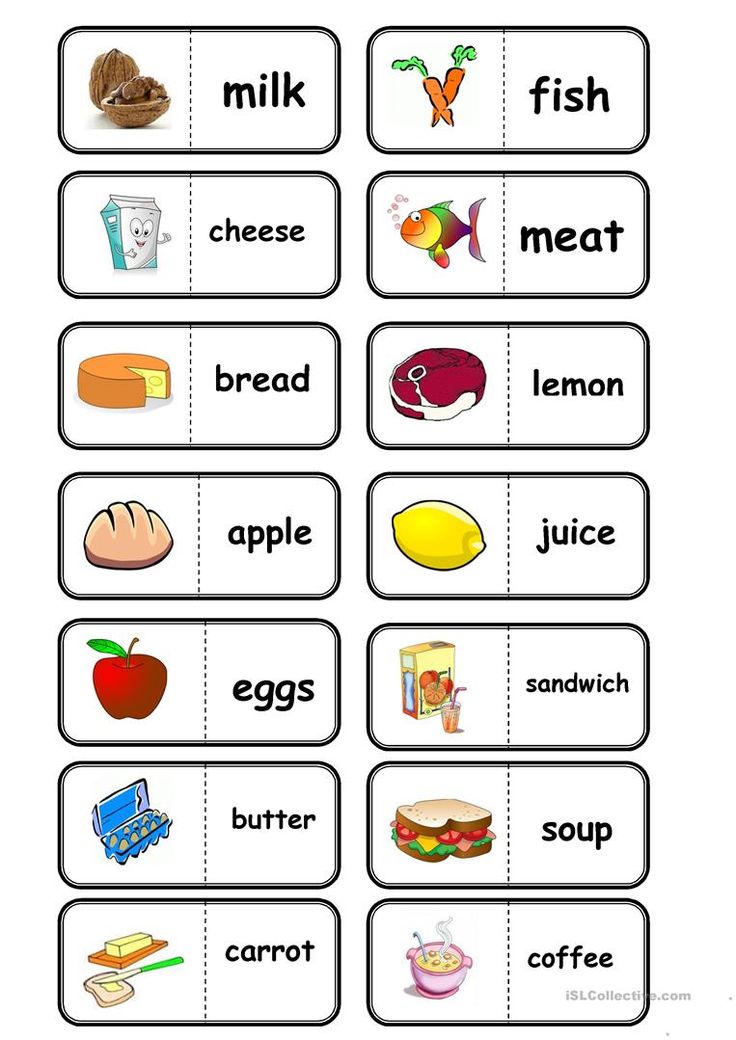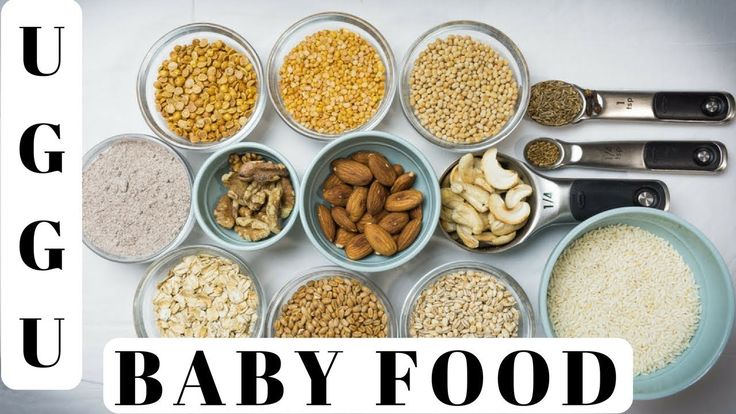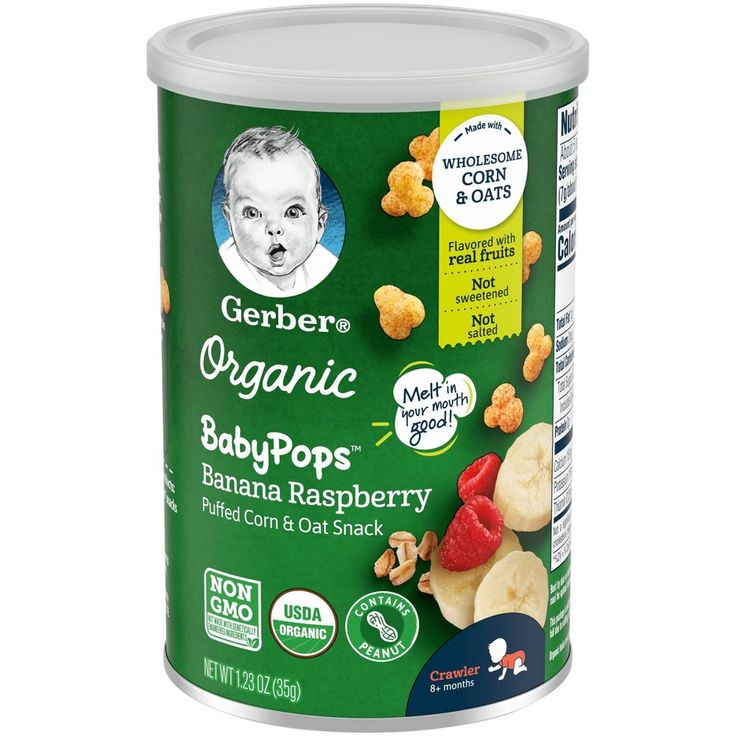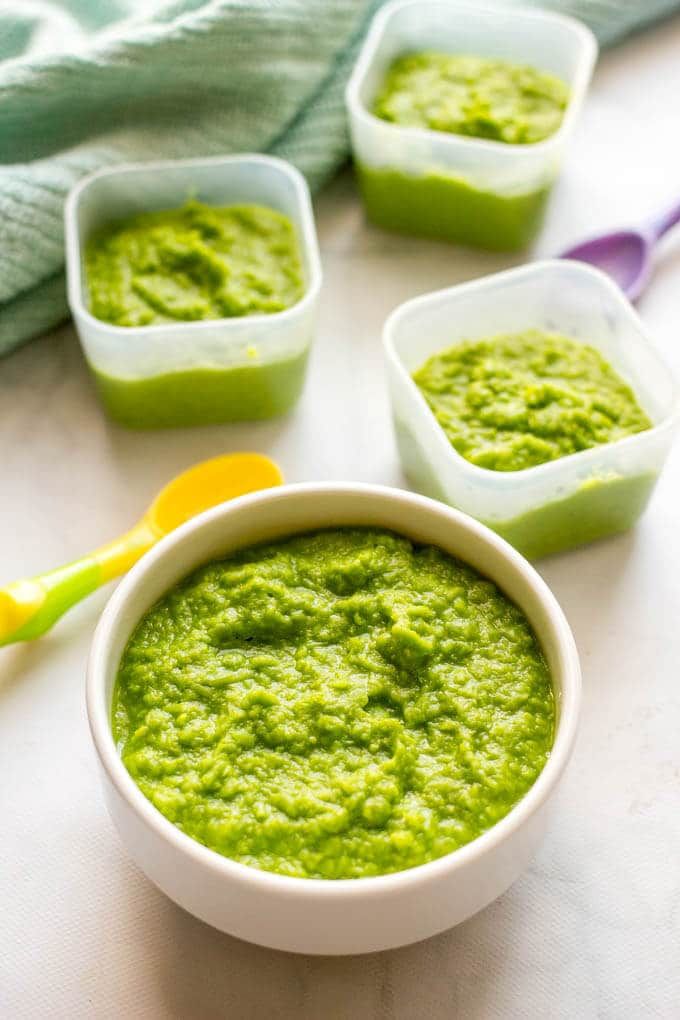Good food for baby constipation
Are There Baby Foods that Help with Constipation?
While parenting brings many surprises, one of them is likely how much you’ll think about poop, or lack thereof, especially during that first year. But here you are worrying about your baby’s digestive tract and convinced that they’re constipated.
If you’ve recently introduced your baby to solid food, then your worries may be on target: solid foods can put a strain on your baby’s developing digestive tract and cause constipation. But there are things you can do to help!
Before you begin treating constipation you should determine if there is really an issue at all. So here’s the scoop on poop and how to tell if your worries are founded and your baby is constipated.
Breastfed babies
During the first few weeks, you’ll find yourself changing diapers with alarming regularity. Figure in every feed or so.
But don’t despair, because by the time your baby reaches 6 weeks old, they may have a bowel movement only once or twice a day. On the other hand, they may have one only every 7–10 days. (Yep, the frequency really can vary that much.)
The poop is yellow, soft, runny and sometimes lumpy and the smell isn’t unpleasant.
Formula-fed babies
A newborn, formula-fed baby typically poops up to five times a day. At about 6 to 8 weeks, this may decrease to around once a day.
Formula-fed babies have poop that is a camel to brown color with a thicker consistency, more like paste. Most likely, the less-than-aromatic smell means you’ll hermetically seal soiled diapers before you toss them into the garbage.
Signs that your baby is constipated
You’ve noticed that your baby’s tummy isn’t following the schedule that you got used to. Could it be constipation? Here are the signs that could confirm your suspicions:
- You notice that they cry or fuss while they’re trying to have a hard bowel movement.
- The poop, when it does come, is like hard pellets.
- You notice streaks of red blood in the hard poop.
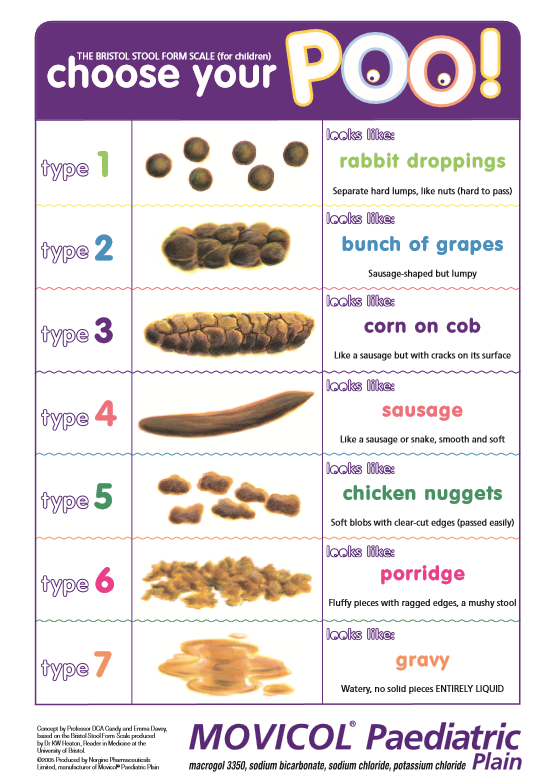
While it’s not easy for a baby on a liquid diet to become constipated, trouble can start when you start introducing your baby to solid foods at around 6 months. Here’s why:
New food types
Think of it as a learning curve: Your baby’s body is learning how to cope with a new kind of food to digest as they move away from their full liquid diet and you need to soften the learning curve. (Pardon the irresistible pun.)
Changes to fluid intake
Decreased fluids will make your baby’s poop harder and more difficult to push out. If they’ve started solids, they may need to up their fluid intake to offset the solid food. And if your baby is teething or feeling unwell, it can also lead to them taking in less fluid than usual.
Lack of fiber
Even though they’re just starting out, babies’ tummies work like ours. While initially the move to solids that have fiber (from breast milk or formula, which don’t) can cause temporary constipation, their tummies will adjust.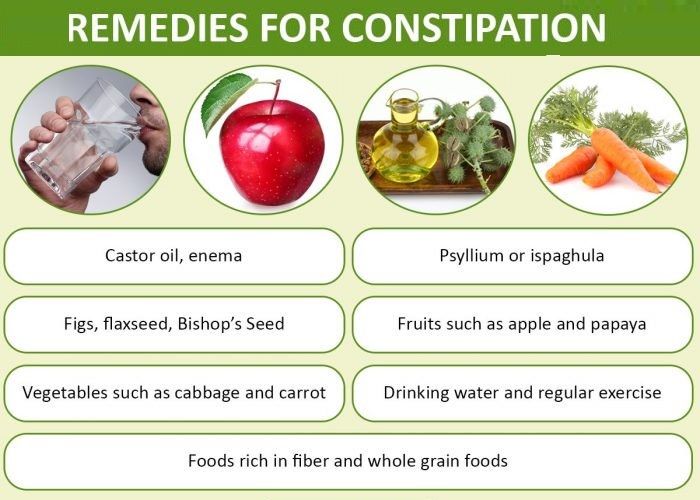
Make sure to monitor your baby’s fiber intake and pair it with plenty of hydration for a smooth ride the same way that you monitor yours.
OK, so you’ve confirmed that your baby is constipated. The next step is helping to alleviate the strain on their developing digestive system.
Remember that you can keep offering these foods as your baby develops into a toddler and beyond. In fact, there is little research or evidence to support specific foods (including high fiber ones) in treating or preventing constipation in infants. Most of these recommendations are based on evidence for older adults and children.
Keep in mind that good practice when introducing solids is to introduce foods as single ingredients. That way, if your baby is allergic to certain foods, you’ll be able to more easily trace the source.
If your little one hasn’t tried these foods before, don’t rush the process. Test out one at a time and then introduce combinations once you’re confident they’re well tolerated.
- Back to basics. Give your baby’s digestive tract a break by feeding them mashed avocado or sweet potato purée. These are easy to digest and may give your baby the kick start they need.
- B vegetables. Think broccoli, Brussels sprouts, and beans. Purée these for a meal filled with fiber.
- P fruits. Your grandmother was right — bring on the prunes for quick work. A purée that includes a mix of prunes plus pears, plums, or peaches should work magic. Try subbing the prunes with dates for a change.
- Bring on the fiber. If your baby is over 8 months, you can offer them whole grains like oatmeal, fiber-rich cereals, whole wheat pasta, and brown rice.
- Water intake. Until 6 months an exclusively breastfed or formula-fed baby doesn’t need to drink water. Above this age, you can introduce small amounts of water.
Plums and pears with cinnamon
Cut 2 or 3 pears and plums into small pieces.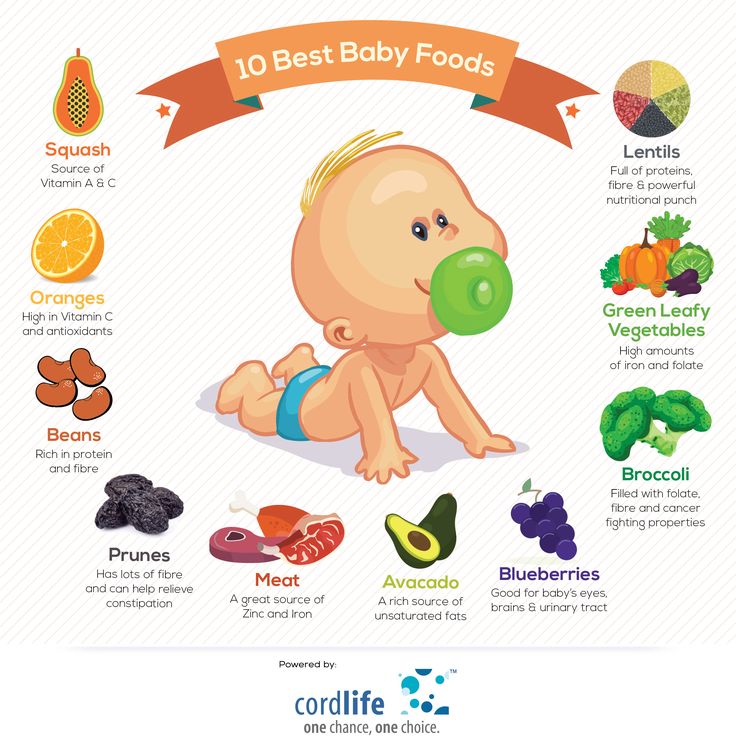 Place in a saucepan with a small amount of water and simmer until soft. Add in a sprinkle of cinnamon. Blend thoroughly.
Place in a saucepan with a small amount of water and simmer until soft. Add in a sprinkle of cinnamon. Blend thoroughly.
Sweet potato with apple and peach
Cut half a sweet potato, one apple, and half a peach into small pieces. Place in steamer basket and cook until tender. Blend until smooth.
Spinach and apple purée
Chop two apples into small chunks and cook in saucepan with about 1/2 cup of water. When they’re tender, add about 1 cup of spinach and cook another 2 to 3 minutes. Purée until smooth. Can be seasoned with cinnamon and ginger.
Some sources suggest prune, pear, and apple juices help to increase the water content in poop and can ease constipation.
However, the American Academy of Pediatrics recommends steering clear of fruit juice for children younger than 1 year old. You can stick with these fruits as purées for similar effects.
What is it about prune juice? The high levels of sorbitol and phenolic substances in prune juice and dried plums act as a laxative and diuretic properties. So if your child is over 1 year old, you can use small amounts of prune juice to encourage their system to run.
So if your child is over 1 year old, you can use small amounts of prune juice to encourage their system to run.
Some studies show that constipation may affect as much as 30 percent of children. If your child is part of the unlucky statistic, here are some foods that you may want to give them smaller amounts of until it passes:
- bananas
- dairy products such as cheese and yogurt
- low fiber foods like white rice, white bread, and white pasta
If you’re like most parents, you’ll be up for whatever you can try to help your baby get comfortable fast. Here are a few tricks that you can use to ease your baby’s constipation:
- Warm baths. These can relax those abdominal muscles and get them working.
- Exercise. Lay your baby on their back and push their legs alternately as if they’re cycling a bike. Alternatively, hold their knees and feet together and push their feet towards their belly.
- Massage.
 Use your fingertip to draw clockwise circles on your baby’s stomach.
Use your fingertip to draw clockwise circles on your baby’s stomach.
If you see that despite your home remedies, your baby still is having hard stools or hasn’t pooped after 2 or 3 days from their last hard stool, then contact your pediatrician. Especially if you consistently notice blood in their poop or your baby is extremely irritable and appears to be in pain.
While dealing with your baby’s toilet issues may seem a tad unsavory, you’ll soon be so used to it, that you’ll find yourself sharing your insights over coffee with other parents. And don’t be shy about sharing the yummy food combinations you discover to keep things moving.
Are There Baby Foods that Help with Constipation?
While parenting brings many surprises, one of them is likely how much you’ll think about poop, or lack thereof, especially during that first year. But here you are worrying about your baby’s digestive tract and convinced that they’re constipated.
If you’ve recently introduced your baby to solid food, then your worries may be on target: solid foods can put a strain on your baby’s developing digestive tract and cause constipation.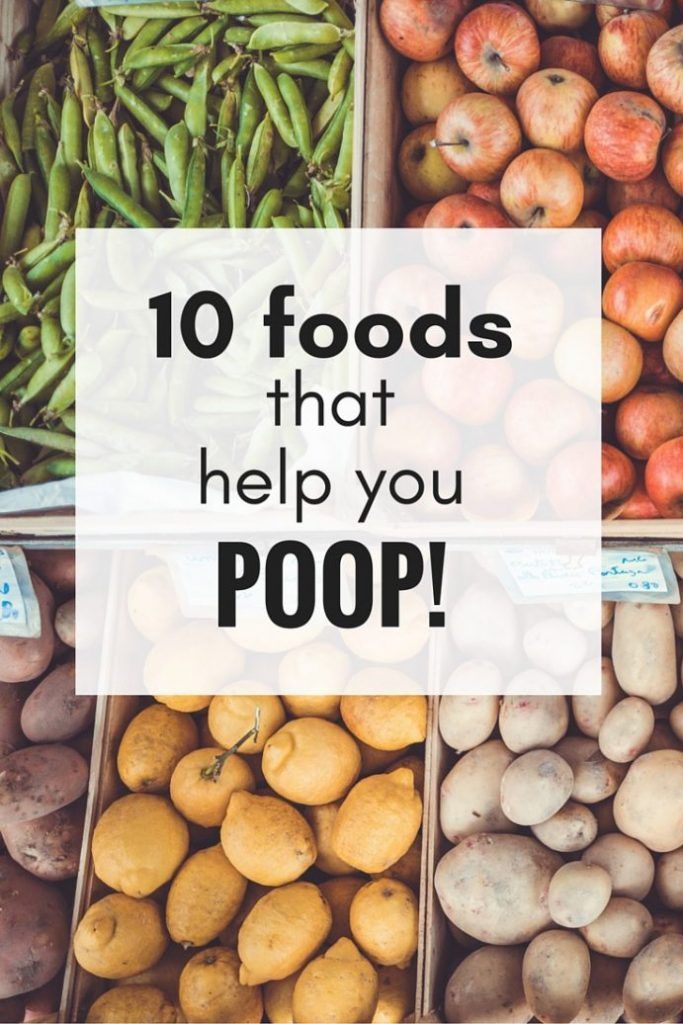 But there are things you can do to help!
But there are things you can do to help!
Before you begin treating constipation you should determine if there is really an issue at all. So here’s the scoop on poop and how to tell if your worries are founded and your baby is constipated.
Breastfed babies
During the first few weeks, you’ll find yourself changing diapers with alarming regularity. Figure in every feed or so.
But don’t despair, because by the time your baby reaches 6 weeks old, they may have a bowel movement only once or twice a day. On the other hand, they may have one only every 7–10 days. (Yep, the frequency really can vary that much.)
The poop is yellow, soft, runny and sometimes lumpy and the smell isn’t unpleasant.
Formula-fed babies
A newborn, formula-fed baby typically poops up to five times a day. At about 6 to 8 weeks, this may decrease to around once a day.
Formula-fed babies have poop that is a camel to brown color with a thicker consistency, more like paste.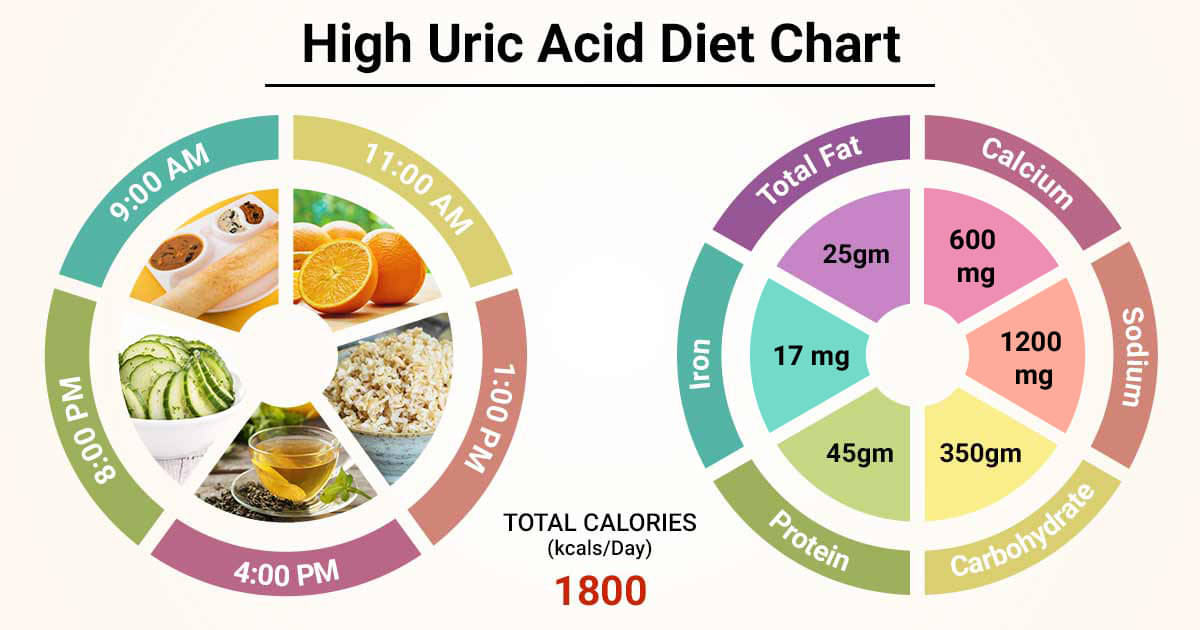 Most likely, the less-than-aromatic smell means you’ll hermetically seal soiled diapers before you toss them into the garbage.
Most likely, the less-than-aromatic smell means you’ll hermetically seal soiled diapers before you toss them into the garbage.
Signs that your baby is constipated
You’ve noticed that your baby’s tummy isn’t following the schedule that you got used to. Could it be constipation? Here are the signs that could confirm your suspicions:
- You notice that they cry or fuss while they’re trying to have a hard bowel movement.
- The poop, when it does come, is like hard pellets.
- You notice streaks of red blood in the hard poop.
While it’s not easy for a baby on a liquid diet to become constipated, trouble can start when you start introducing your baby to solid foods at around 6 months. Here’s why:
New food types
Think of it as a learning curve: Your baby’s body is learning how to cope with a new kind of food to digest as they move away from their full liquid diet and you need to soften the learning curve. (Pardon the irresistible pun.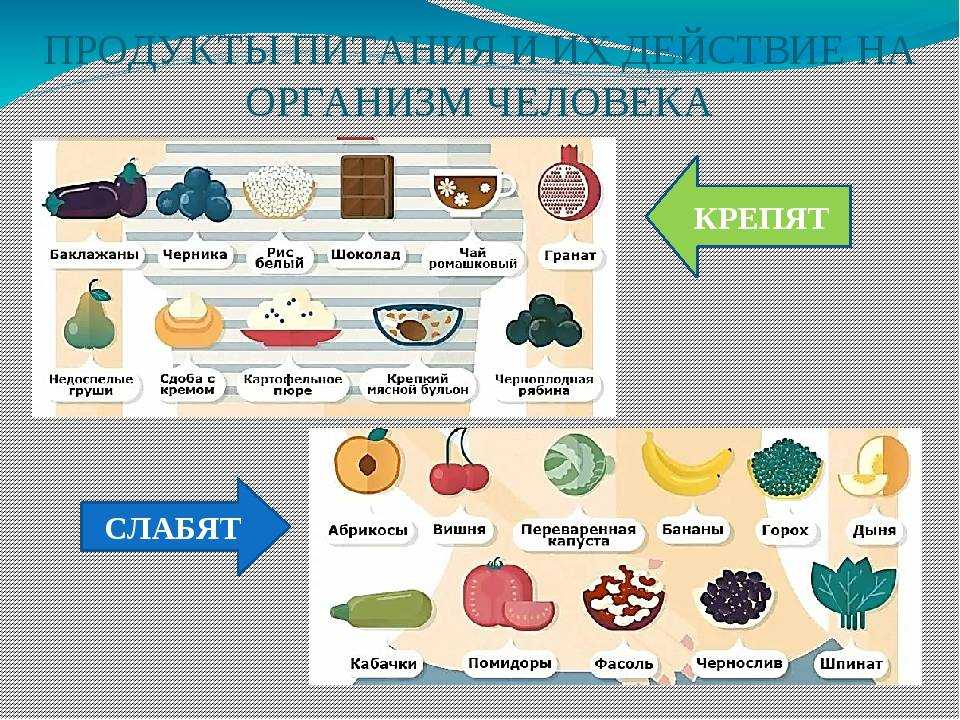 )
)
Changes to fluid intake
Decreased fluids will make your baby’s poop harder and more difficult to push out. If they’ve started solids, they may need to up their fluid intake to offset the solid food. And if your baby is teething or feeling unwell, it can also lead to them taking in less fluid than usual.
Lack of fiber
Even though they’re just starting out, babies’ tummies work like ours. While initially the move to solids that have fiber (from breast milk or formula, which don’t) can cause temporary constipation, their tummies will adjust.
Make sure to monitor your baby’s fiber intake and pair it with plenty of hydration for a smooth ride the same way that you monitor yours.
OK, so you’ve confirmed that your baby is constipated. The next step is helping to alleviate the strain on their developing digestive system.
Remember that you can keep offering these foods as your baby develops into a toddler and beyond. In fact, there is little research or evidence to support specific foods (including high fiber ones) in treating or preventing constipation in infants. Most of these recommendations are based on evidence for older adults and children.
Most of these recommendations are based on evidence for older adults and children.
Keep in mind that good practice when introducing solids is to introduce foods as single ingredients. That way, if your baby is allergic to certain foods, you’ll be able to more easily trace the source.
If your little one hasn’t tried these foods before, don’t rush the process. Test out one at a time and then introduce combinations once you’re confident they’re well tolerated.
- Back to basics. Give your baby’s digestive tract a break by feeding them mashed avocado or sweet potato purée. These are easy to digest and may give your baby the kick start they need.
- B vegetables. Think broccoli, Brussels sprouts, and beans. Purée these for a meal filled with fiber.
- P fruits. Your grandmother was right — bring on the prunes for quick work. A purée that includes a mix of prunes plus pears, plums, or peaches should work magic.
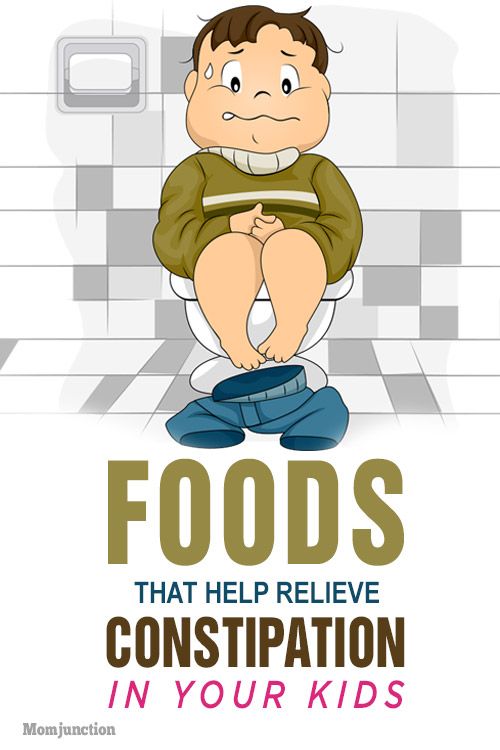 Try subbing the prunes with dates for a change.
Try subbing the prunes with dates for a change. - Bring on the fiber. If your baby is over 8 months, you can offer them whole grains like oatmeal, fiber-rich cereals, whole wheat pasta, and brown rice.
- Water intake. Until 6 months an exclusively breastfed or formula-fed baby doesn’t need to drink water. Above this age, you can introduce small amounts of water.
Plums and pears with cinnamon
Cut 2 or 3 pears and plums into small pieces. Place in a saucepan with a small amount of water and simmer until soft. Add in a sprinkle of cinnamon. Blend thoroughly.
Sweet potato with apple and peach
Cut half a sweet potato, one apple, and half a peach into small pieces. Place in steamer basket and cook until tender. Blend until smooth.
Spinach and apple purée
Chop two apples into small chunks and cook in saucepan with about 1/2 cup of water. When they’re tender, add about 1 cup of spinach and cook another 2 to 3 minutes. Purée until smooth. Can be seasoned with cinnamon and ginger.
Purée until smooth. Can be seasoned with cinnamon and ginger.
Some sources suggest prune, pear, and apple juices help to increase the water content in poop and can ease constipation.
However, the American Academy of Pediatrics recommends steering clear of fruit juice for children younger than 1 year old. You can stick with these fruits as purées for similar effects.
What is it about prune juice? The high levels of sorbitol and phenolic substances in prune juice and dried plums act as a laxative and diuretic properties. So if your child is over 1 year old, you can use small amounts of prune juice to encourage their system to run.
Some studies show that constipation may affect as much as 30 percent of children. If your child is part of the unlucky statistic, here are some foods that you may want to give them smaller amounts of until it passes:
- bananas
- dairy products such as cheese and yogurt
- low fiber foods like white rice, white bread, and white pasta
If you’re like most parents, you’ll be up for whatever you can try to help your baby get comfortable fast.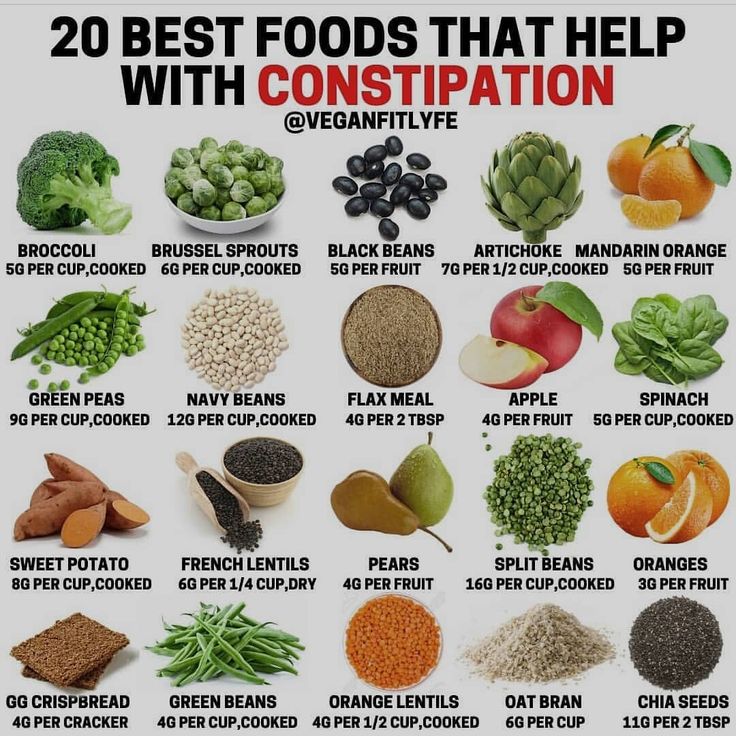 Here are a few tricks that you can use to ease your baby’s constipation:
Here are a few tricks that you can use to ease your baby’s constipation:
- Warm baths. These can relax those abdominal muscles and get them working.
- Exercise. Lay your baby on their back and push their legs alternately as if they’re cycling a bike. Alternatively, hold their knees and feet together and push their feet towards their belly.
- Massage. Use your fingertip to draw clockwise circles on your baby’s stomach.
If you see that despite your home remedies, your baby still is having hard stools or hasn’t pooped after 2 or 3 days from their last hard stool, then contact your pediatrician. Especially if you consistently notice blood in their poop or your baby is extremely irritable and appears to be in pain.
While dealing with your baby’s toilet issues may seem a tad unsavory, you’ll soon be so used to it, that you’ll find yourself sharing your insights over coffee with other parents. And don’t be shy about sharing the yummy food combinations you discover to keep things moving.
Proper diet for constipation in a child from 1 to 7 years old
Constipation is a rather unpleasant, but very common occurrence in children of all ages. From birth to a year, a child's stool usually does not cause any special problems, and with the introduction of complementary foods, it is finally getting better. However, after the baby is one year old, the problem may return again. Parents usually manage to cope with it on their own by making adjustments to the diet. This article will provide a diet for constipation in a child. nine0003
Causes of problems with stools
There are many factors that affect the appearance of constipation. Among them are physiological, due to the peculiarities of the age period. From 1 to 3 years, stool retention can be provoked by:
- slow intestinal motility;
- dysbacteriosis - although recent studies claim that such a disease does not exist, nevertheless, a violation of the microflora of the gastrointestinal tract and a lack of probiotic bacteria are quite capable of provoking various defecation difficulties; nine0010
- helminthiasis;
- new food introduced for the first time;
- sudden change of scene;
- lack of fluid intake;
- products that cause intestinal disturbances;
- enzyme deficiency.
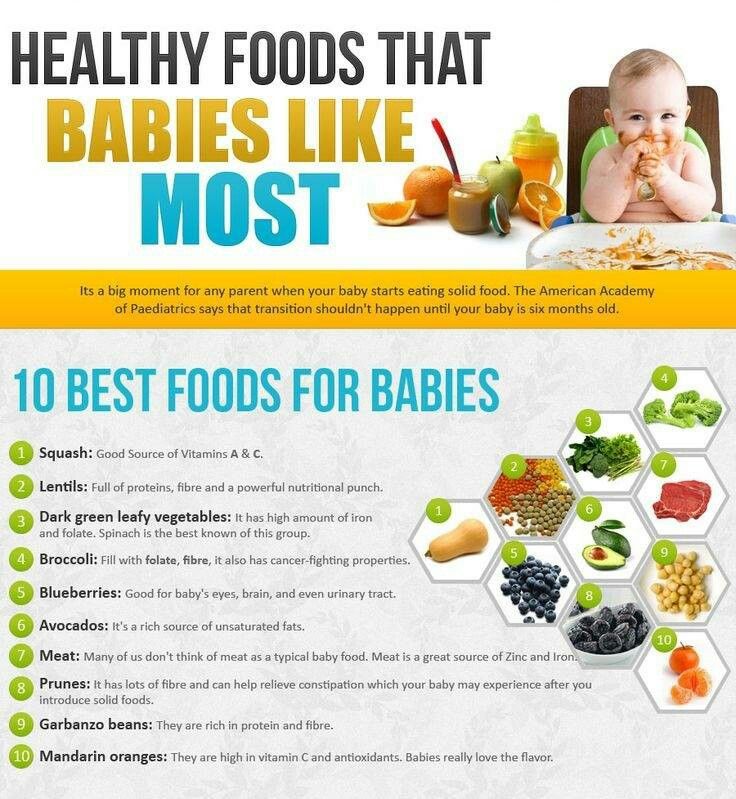
Diet for constipation in a child should be carefully considered. More on that below.
Constipation: therapy with drugs and folk...
Discomfort. Something pulls, somewhere it hurts. Heaviness in the intestines and do not want to move. But don't...
Additional factors
Children over 3 years of age also often suffer from the inability to defecate normally until the start of school, that is, up to 6-7 years. They, in addition to the previous list, have new reasons:
- pain during defecation due to too dry and hard feces, and a child at this age may already consciously refuse to go to the toilet if he feels discomfort;
- diseases of the gastrointestinal tract - in these cases, other symptoms will definitely appear, it is important to immediately go with the baby to the pediatrician; nine0010
- fissures in the anus causing severe pain;
- embarrassment to empty the bowels in public places, next to other children - in kindergarten, school, sometimes there is a strongly developed disgust in the child, which also prevents going to the toilet anywhere other than at home.

The most common cause of constipation in children from 1 to 7 years old is an incorrect menu and non-compliance with the drinking regimen. A diet for constipation in children of 6 years old will be a way out of the situation. nine0003
Proper nutrition for constipation - specific features, ...
According to most doctors, the main culprits in almost all digestive problems are ...
The effect of drinks on stool quality
Inadequate fluid intake can cause constipation even in adults , and even more so, in children with their delicate, newly formed digestive system. The introduction of complementary foods, the transition to solid foods, the cessation of breastfeeding, or the rejection of formula feeding should definitely encourage parents to reconsider the issue of adequate provision of water for the child. A diet for constipation in children of 1 year old is made with this in mind. nine0003
Children of different ages need different amounts of water to drink per day, and it does not have to be pure water.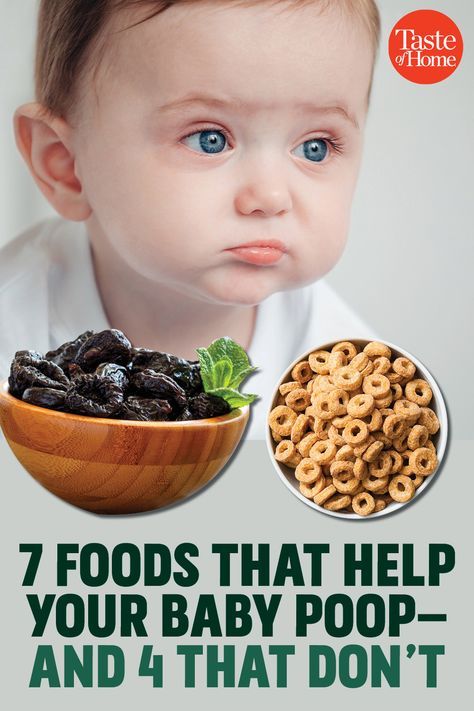 Dried fruit compotes, decoctions of herbs, such as chamomile, fennel, special children's teas, freshly squeezed juices, except for sour ones, fresh sour-milk products will be useful for constipation. All drinks should be low concentration, prepared without added sugar.
Dried fruit compotes, decoctions of herbs, such as chamomile, fennel, special children's teas, freshly squeezed juices, except for sour ones, fresh sour-milk products will be useful for constipation. All drinks should be low concentration, prepared without added sugar.
Constipation in children 6 years old: possible causes and methods of treatment
Children often have problems with stools due to impaired functionality not yet ...
The diet for constipation in a child is based on this.
Fluid rate depending on age
Normally, the amount of fluid entering the body, including with food, should be approximately as follows:
- 1 year - 1.1-1.3 l;
- 2 years - 1.4-1.5 liters;
- 3 years - 1.5-1.6 liters;
- 4 and 5 years - 1.6-1.7 liters;
- 6 and 7 years - 1.6-1.8 liters.
What does the diet for constipation in children 5 years old take into account?
What liquid to give? nine0005
It is not recommended to give babies coffee, strong black tea, carbonated sweet drinks.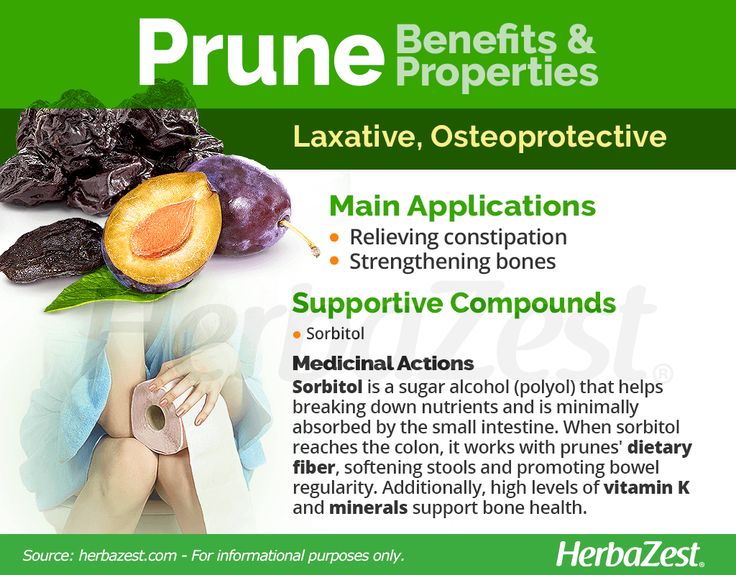 It is necessary to limit the amount of cow's milk, especially fresh milk, packaged and freshly squeezed juices. The former contain a lot of carbohydrates, the latter are quite concentrated, capable of causing allergic reactions. Such juices must be diluted with water in a ratio of 1:3. This also suggests a diet for constipation in children under one year old.
It is necessary to limit the amount of cow's milk, especially fresh milk, packaged and freshly squeezed juices. The former contain a lot of carbohydrates, the latter are quite concentrated, capable of causing allergic reactions. Such juices must be diluted with water in a ratio of 1:3. This also suggests a diet for constipation in children under one year old.
It is helpful to give your child a glass of clean cool water before breakfast. Warm will not work, as it weakens peristalsis. The lower the temperature, the better is the stimulation of the gastrointestinal tract. First, you should give water at room temperature, then gradually lower the degree, bringing it to a very cool, but not causing discomfort. nine0003
General nutritional advice for normal stools
Good eating habits should be formed from the very beginning of the introduction of complementary foods, especially if there is a hereditary tendency to constipation. An older child who has often received tasty, but not very healthy food, may resist the transfer to the food necessary for good bowel function.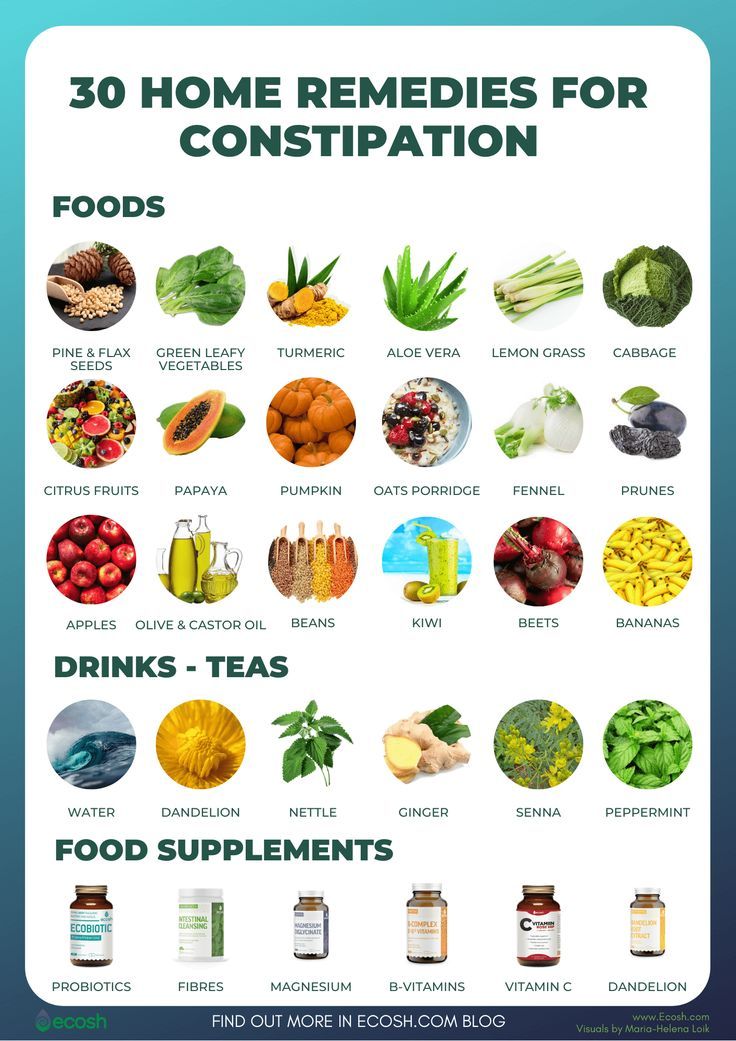 The diet for constipation in children 2 years of age should be as balanced as possible.
The diet for constipation in children 2 years of age should be as balanced as possible.
Approved Products
The diet of all children from one to seven years old, suffering from difficult bowel movements, should include foods that stimulate rapid bowel movements, containing enough vitamins, microelements, beneficial bacteria, fiber:
- Cereals - buckwheat, brown or brown rice in small quantities, oatmeal large flakes or oats, wheat. You should not get involved in cereals.
- Vegetables - beets, carrots, broccoli, cauliflower and white cabbage, pumpkin, bell peppers, cucumbers, tomatoes, some potatoes and others should form the basis of the diet. nine0010
- Fruits and berries - apples, plums, apricots, bananas (a little), currants, raspberries, kiwi.
- Greens - spinach, lettuce, Chinese cabbage, dill, parsley.
- Dried fruits - prunes, dried apricots, raisins, dates, figs.
- Fermented milk products - kefir (only fresh, up to 3 days, otherwise you will get the opposite effect), bio-yogurt, curdled milk, fermented baked milk, children's curds.
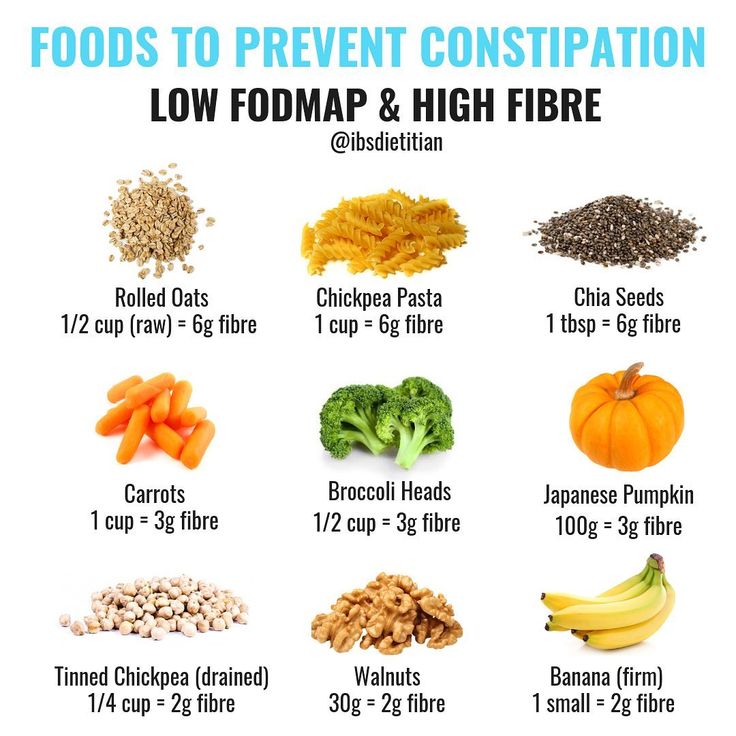
- Dried bran or rye bread, bran itself.
- Honey and homemade jam from suitable berries and fruits. nine0010
- Low-fat meat and fish products.
Dishes should be boiled, stewed, baked, steamed, while still adding a little olive oil. Salads made from fresh fruits and vegetables, seasoned with the same butter or natural yogurt, cottage cheese, have a good effect.
Diet for constipation in a child - forbidden foods
Fast food, sweets, rich soups, marinades, pickles, smoked and fried foods should definitely be excluded from the nutrition list. Specifically, it is worth minimizing the use of:
- Macaroni.
- Semolina and white rice.
- Blueberries.
- Pear
- White bread.
- Cocoa, coffee, strong tea.
- Chocolate.
- Kisel.
- Fatty fish and meat - mackerel, herring, trout, lamb, some parts of pork, duck and goose meat.
- Dumplings, dumplings.
- Cheese, milk.

- Legumes - peas, lentils, beans - should be limited.
The diet for constipation in children 2 years old is based on this. nine0003
Any foods that slow down the process of defecation or thicken the stool should be limited as much as possible, but it is better to completely eliminate it from the diet, doing it gradually, step by step. Ideally, they should not be given to the child from the very beginning.
It is very important for a child under 3 years of age to strictly follow nutritional recommendations. After 3 and up to 7 years, you can sometimes make some indulgences, but it is important not to deviate from the rules too often. So the diet for constipation in children 4 years old will be slightly different from the diet of a two-year-old child. nine0003
Special table
For children and adults who often have constipation, there is even a diet that is number 3 in the list of therapeutic diets. This is a completely balanced menu, enriched with essential nutrients, the set of products of which has a positive effect on difficult stools.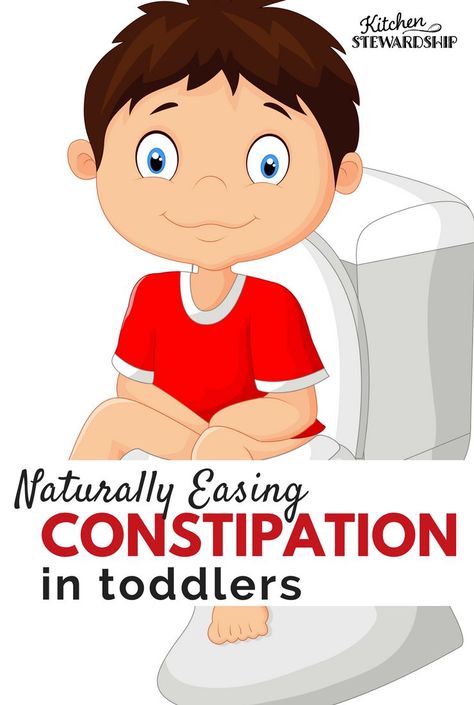
Consider what diet number 3 includes for children with constipation.
Meals should be small and divided into 4-6 meals. So it is easier for the stomach to digest incoming food, and it is easier for the intestines to excrete it. Products recommended for consumption:
- Vegetables - tomatoes, cucumbers, cauliflower, marrows, pumpkins, carrots, beets. White cabbage should not be eaten, as it provokes strong gas formation, which slows down peristalsis. Potatoes can only be eaten in a peeled and baked form.
- There are almost no restrictions on fruits and berries: strawberries, currants, blackberries, strawberries, cranberries, cranberries, bananas, apples, pears, apricots, plums, watermelons. An exception is grapes, as well as cabbage, which contributes to the appearance of flatulence. nine0010
- White fish - perch, pike, bream, carp, cod, hake, pollock.
- Lean meats and poultry - turkey, rabbit, beef, veal.
- Toasted rye or grain bread with bran, seeds or other grain additives.

- Greens, celery.
- Homemade jams, jams, compotes sweetened with honey - only allowed on the children's menu.
- Dried fruits.
- Cottage cheese and fermented milk drinks, preferably homemade.
- Porridges from barley, buckwheat, wheat groats.
- Sunflower and pumpkin seeds, nuts.
Diet for constipation in a child 3 years of age: recommendations
Soups are cooked light, on meat and fish broths, diluted with water or weakly cooked, but without the addition of meat and fish. All dishes need to be baked, boiled, stewed or cooked in a double boiler.
Meat or fish is consumed once a day. Occasionally, you can replace them with turkey ham. It is undesirable to remove the peel from fruits and vegetables, since it is it that contains the greatest amount of fiber. You can add yogurt to fruit salads, and a couple of tablespoons of bran to vegetable salads. nine0003
Weak children's organisms up to 5 years old will benefit from baked vegetables and fruits, you should not get carried away with fresh ones, so as not to overload the stomach and disrupt only the established process of digestion.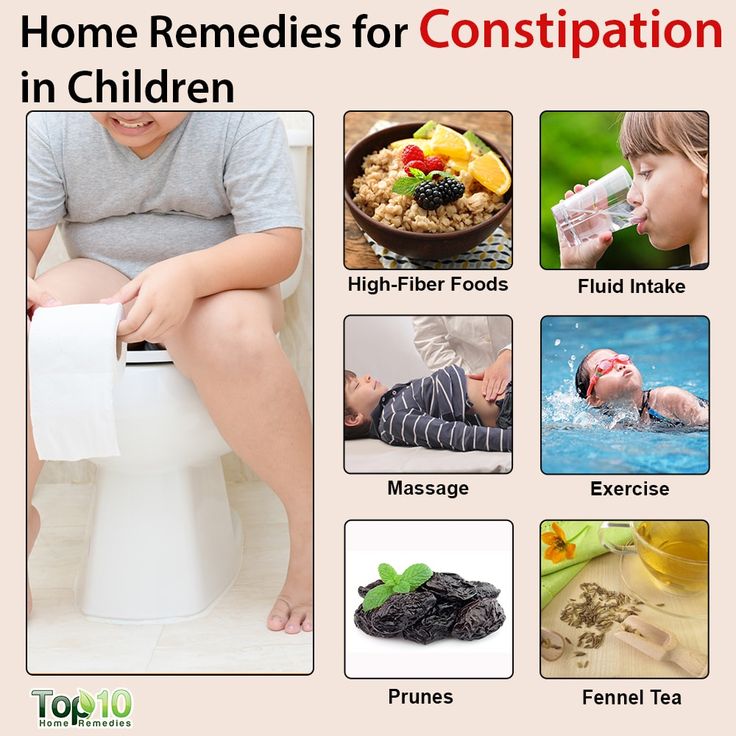 For example, baked apples are an excellent remedy for constipation.
For example, baked apples are an excellent remedy for constipation.
Porridges should be boiled crumbly, because liquid ones will envelop the walls of the stomach, inhibiting the digestion of food. For the same reason, it is undesirable to cook mashed soups, but light broths with black bread croutons will do well. nine0003
Children will appreciate delicious dishes such as pumpkin porridge, pumpkin and dried fruit pancakes, or simply baked pumpkin or an apple smeared with honey. These dishes can be offered as a dessert, afternoon snack or breakfast. Meat and poultry are included in the menu up to 3 times a week, the rest of the time protein is obtained from fish, dairy products and steamed omelet.
Child-friendly recipes
If your doctor has prescribed diet number 3 for children with constipation, then feeding your baby correctly, tasty and varied will not be difficult. From the permitted products, you can cook many delicious dishes that will appeal to both kids and older children.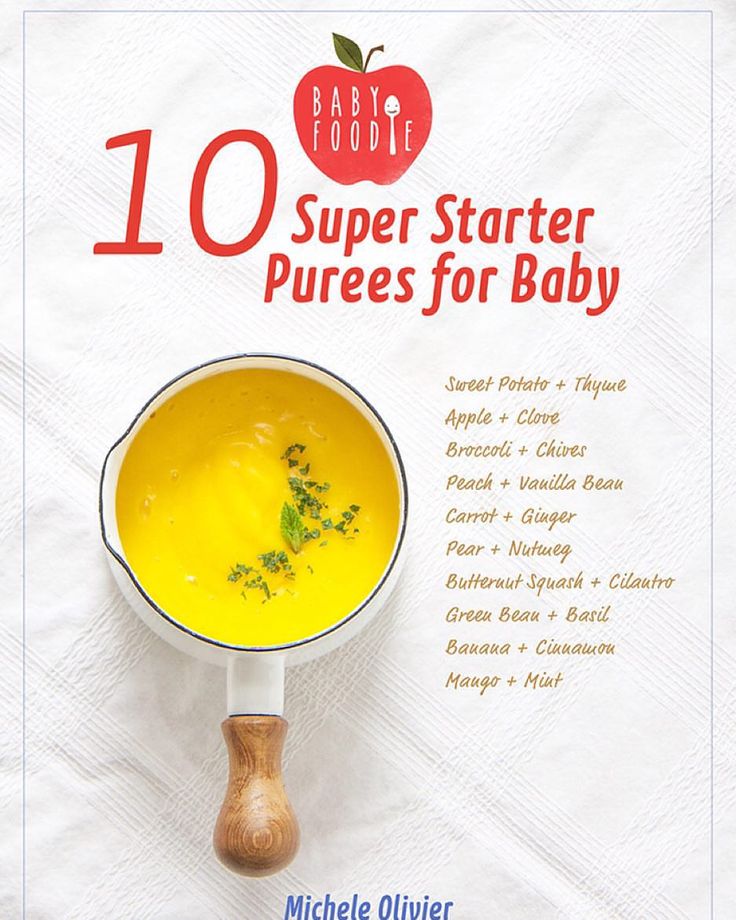 nine0003
nine0003
- Beetroot and prunes salad can be given to children from 2 years of age. Beets should be boiled until tender and grated, prunes should be soaked in boiling water and finely chopped. You can fill the salad with natural yogurt or sour cream 10% fat.
- Prunes soak in boiling water until soft, cut into small pieces or puree for babies from one year old. Mix dried fruit with fresh kefir, bio-yogurt, curdled milk or fermented baked milk and take shortly before bedtime.
- Baked omelet with zucchini, herbs and tomatoes. The egg is beaten with a spoonful of water or low-fat milk, mixed with finely chopped or mashed greens. The dishes for the oven should be greased with a thin layer of oil, put the tomatoes and zucchini, pour the egg mixture and bake until browned - 10-15 minutes. nine0010
Conclusion
Most parents who prepare the right foods for their children to help eliminate constipation note that the effect is observed after only 2-3 weeks. In children, bloating disappears, the stool becomes much softer, defecation is observed every day.
In children, bloating disappears, the stool becomes much softer, defecation is observed every day.
The diet itself is usually prescribed for a period of 2 to 4 weeks, but the list of foods allowed and prohibited for constipation should always be at hand and actively used. If the problem is due to genetics, then it would be better to switch to a similar diet for the whole family so that the child does not feel deprived. nine0003
In general, such a diet contributes not only to the normalization of stool, but also to the improvement of the general condition of the child and strengthening his health. The main thing is not to forget that with any problem of the child's body, you must first consult a doctor and not treat yourself.
Proper Diet for Constipation
Understanding Constipation
Constipation, or constipation, is a very common defecation disorder that makes bowel movements difficult. Individual episodes are often associated with nutritional errors or functional disorders, while chronic constipation often indicates diseases of the gastrointestinal tract or other organs and systems.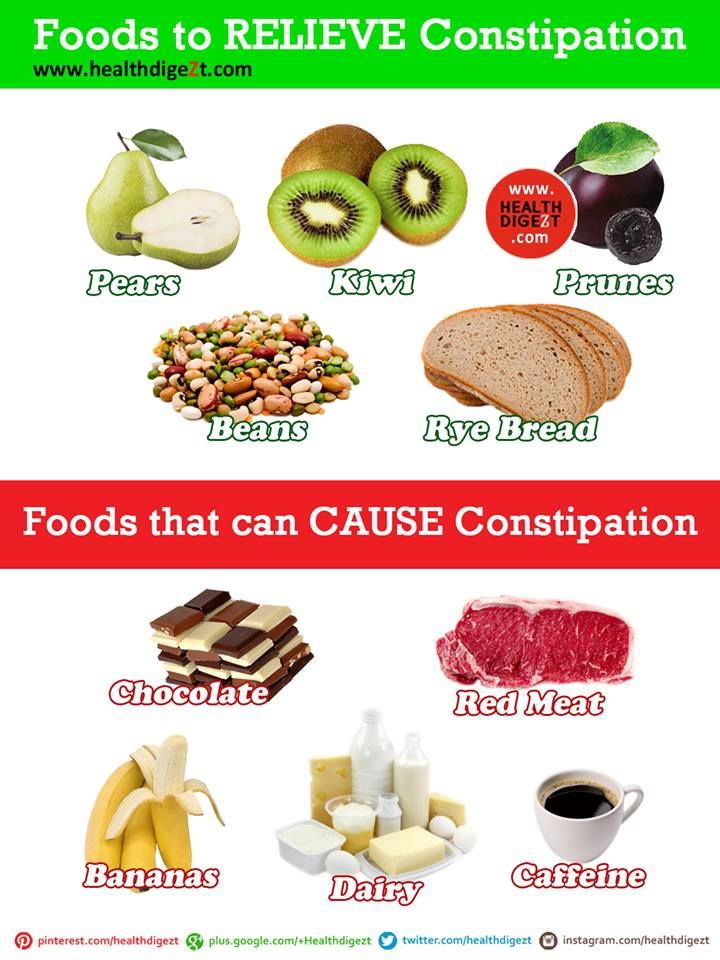 nine0003
nine0003
The key symptoms of constipation are:
- Defecation less than 3 times a week.
- Defecation with dry, hard stools, which often look like separate lumps.
- The need for additional straining for defecation.
- Sensation of "blockage" of the rectum.
- Feeling of incomplete emptying of the bowels.
- The need for assistance with defecation (hand pressure on the abdomen and manual manipulation to remove stool from the rectum). nine0010
Diet for constipation
One of the key roles in the fight against constipation is nutrition correction. Often, changes in eating habits and lifestyle are enough to eliminate constipation that is not associated with other diseases, as well as to prevent their occurrence in the future.
List of useful foods for constipation
Prunes help to cope with constipation. Photo: alexeyzhilkin - ru.freepik.com The basis of the diet of people with a tendency to constipation should be dominated by foods that contain dietary fiber - fiber.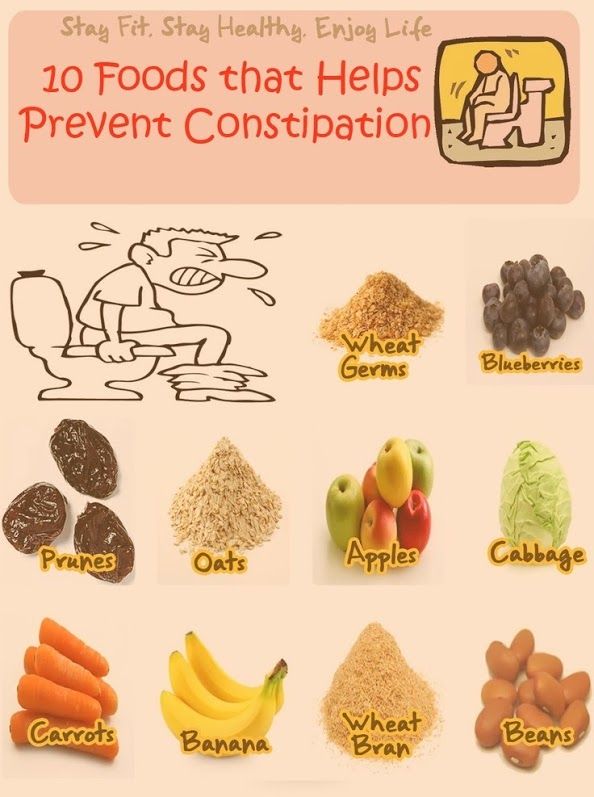 nine0003
nine0003
The most useful foods for constipation are:
- Prunes. The insoluble fiber in prunes increases the amount of water in the stool, preventing constipation. It also contains sugar alcohol (sorbitol), which has a laxative effect.
- Apples. They contain a large amount of pectin, which can improve intestinal motility, promote the growth of beneficial bacteria and eliminate the symptoms of constipation.
- Pears. In addition to being high in fiber, pears also contain fructose and the previously mentioned sorbitol. Due to these substances that are not absorbed in the large intestine, removing water into its lumen, pears can cause a laxative effect. nine0010
- Citrus. Oranges, grapefruits and tangerines are rich in pectin and naringenin, which increase the secretion of fluid into the colon, causing a laxative effect. It is recommended to use them raw.
- Spinach and other greens. Greens such as spinach, brussels sprouts and broccoli are rich not only in fiber, but also in vitamins C and K, as well as folic acid, which have a positive effect on bowel function.
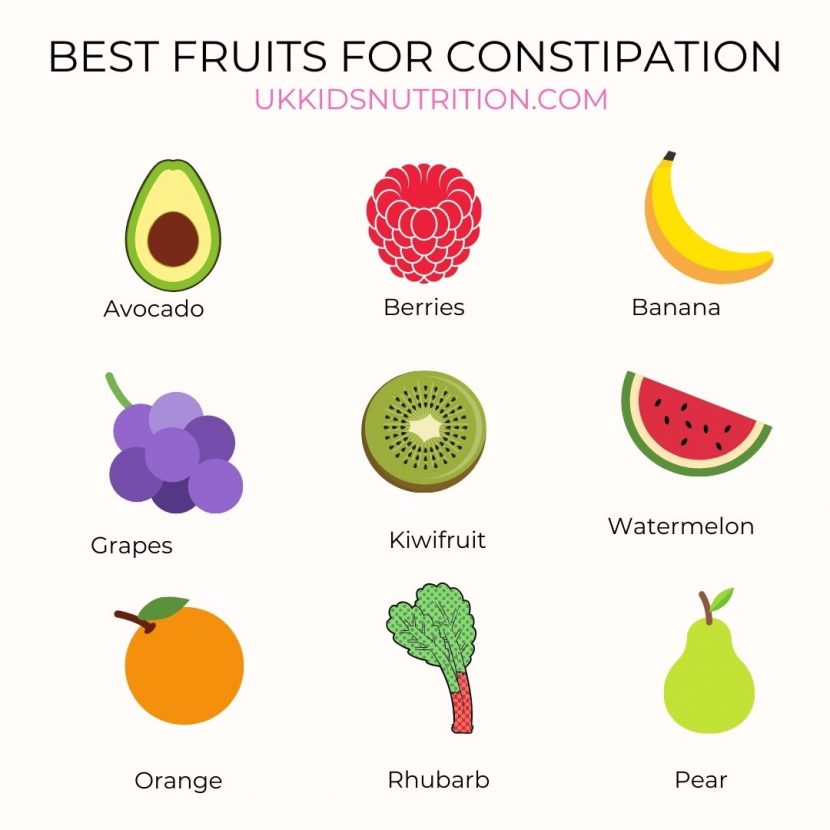
- Legumes: beans, peas and lentils. Legumes contain a mixture of insoluble and soluble fiber. This means they can relieve constipation by bulking up stools, as well as softening them to make bowel movements easier6. nine0010
- Kefir. Contains bacteria and yeast that improve the functioning of the digestive system. It also thins the stool, improving bowel movements.
List of undesirable foods for constipation
Dairy products, red meats and alcohol are not desirable for constipation. Photo: MedPortalCorrection of nutrition for constipation includes not only the addition of more fluid and dietary fiber, but also the restriction or complete rejection of other foods that can provoke this defecation disorder [8]. These products include:
- Alcohol. Alcoholic beverages, especially in large quantities, lead to the loss of large amounts of fluid in the urine, which contributes to constipation [9].
- Milk and dairy products. It is believed that milk, due to the increased sensitivity of the human body to its proteins, can provoke constipation.
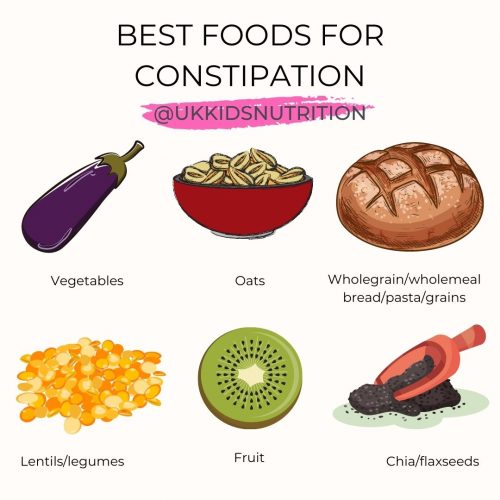 Children under 12 years of age are most susceptible to this effect [10].
Children under 12 years of age are most susceptible to this effect [10]. - Red meats, which are high in fat, increase the risk of constipation [11]. nine0009 Fried food and fast food. Like red meat, these foods are high in fat and low in dietary fiber. In addition, a large amount of salt is used in its preparation, which worsens the course of constipation.
- White rice, unlike brown, lacks bran and other major sources of fiber, which can also cause constipation.
- Products containing gluten. Gluten is a protein found in grains such as wheat, barley, and rye. It has been found to be associated with constipation, and also impairs bowel function and damages it in celiac disease and irritable bowel syndrome [12]. nine0010
Nutrition for children with constipation
Broccoli puree helps to normalize stool in young children. Photo: [email protected] / Depositphotos The fight against constipation in children of preschool and primary school age is similar to that in adults: in such situations, the same advice on nutrition and lifestyle changes is relevant.
“You should try to adjust the stool with a diet: give the child more water (a liter per day or more). Introduce more vegetable fiber (salads, vegetable stews), juices (plums, prunes), fermented milk products (yogurts), laxative foods (beets, pickles), etc. You should also try to involve the child himself in the treatment, make it an entertaining game, motivate for the result. For example, buy a calendar with large cells and draw a smiley in the cell every day when he himself went to the toilet. Five days of independent chair in a row - deserved a guaranteed toy, two weeks in a row - a super prize. Positive reinforcement works wonders, trust me. nine0003
Well, physical activity, of course. Preschoolers do not need to be additionally stimulated, except perhaps to limit the time for gadgets and TV, but schoolchildren already need to be actively urged to enroll in a collective sports section, for example.”
An excerpt from the book of pediatrician Sergei Butriy “Health of the child.
How to learn to cope with diseases and your own panic "
Infants can also suffer from constipation. It is worth noting that normally in infants, the frequency of bowel movements can vary from 1-2 times a day to 1 time in 7-10 days. nine0003
If a child has other symptoms of constipation in addition to infrequent stools, such as increased restlessness during bowel movements and hard lumps of feces, the following dietary changes are recommended [13]:
- to which you can add a mixture of prunes, pears or peaches.
- Recommended vegetables are broccoli, Brussels sprouts and legumes.
- For children over 8 months of age, whole grains such as oatmeal, high fiber cereal, whole wheat pasta, and brown rice are allowed. nine0010
- Controlling the amount of liquid you drink. Until 6 months of age, an exclusively breastfed or formula-fed baby does not need to drink water. Babies over this age can be given a small amount of water.
The following can also help a small child with constipation [14]:
- Warm baths.
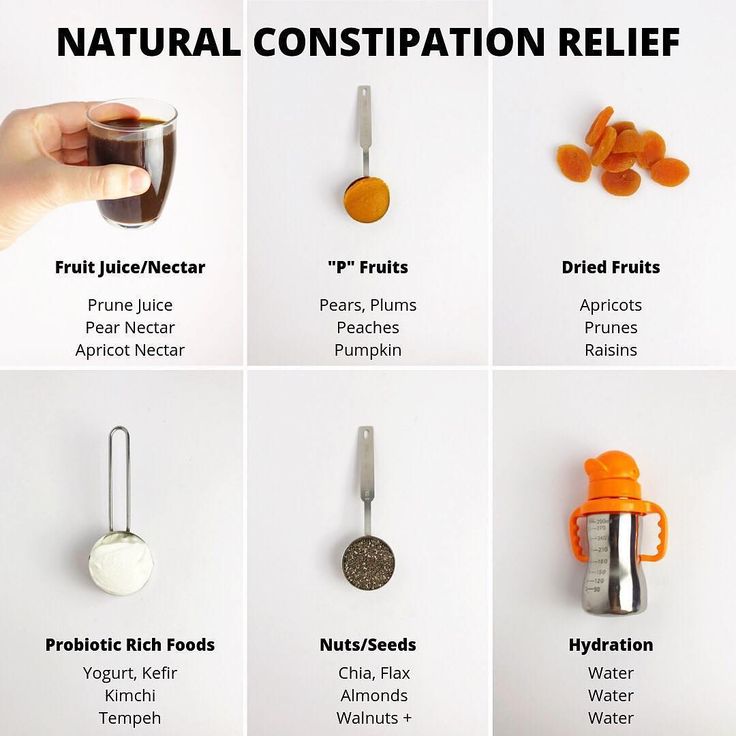 They relax the abdominal muscles and improve peristalsis.
They relax the abdominal muscles and improve peristalsis. - Exercises. Having put the child on his back, you can alternately bend his legs, as if he were riding a bicycle. nine0010
- Massage. You can improve intestinal motility by drawing circles on the child's stomach in a clockwise direction.
- If constipation persists after a few days of dietary changes, glycerin suppositories for children (suppositories) may be used. However, they are intended for occasional use only. Mineral oils, stimulant laxatives, or enemas should not be used to treat constipation in infants. But for older children with constipation, enemas and the use of laxatives under the supervision of a pediatrician are indicated. nine0010
Consequences of non-compliance with the diet
Without nutritional correction, individual cases of constipation develop into chronic constipation. At the same time, the symptoms of this disorder worsen, and the risk of developing complications increases, the most common of which are [15]:
- Hemorrhoids (Fig.
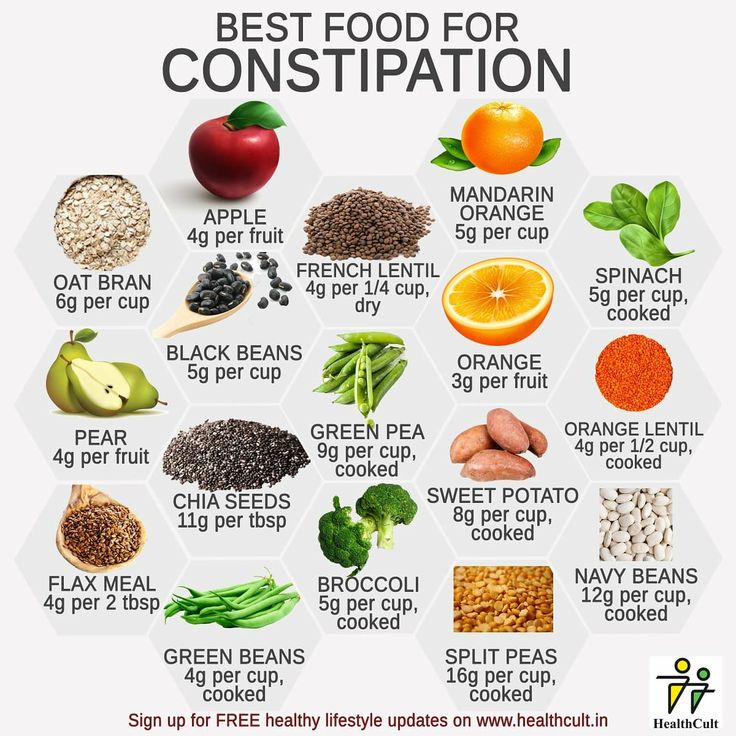 1).
1). - Anal fissures.
- Rectal bleeding.
Inflammation of the mucous membrane of the rectum and sigmoid colon - proctosigmoiditis. nine0003 Figure 1. Stages of development of hemorrhoids. Source: CC0 Public Domain
Conclusion
Proper nutrition and control of fluid intake are the keys to eliminating constipation in most cases. But it is important to understand that this phenomenon can be not only an isolated problem, but also a symptom of other pathologies. Therefore, if defecation disorders persist after changing the diet, you should seek the advice of a specialist.
Sources
- Constipation. National Digestive Diseases Information Clearinghouse. 2019.
- Elise Mandl. The 17 Best Foods to Relieve Constipation. health line. 2018.
- Lever E, Cole J, Scott SM, Emery PW, Whelan K. Systematic review: the effect of prunes on gastrointestinal function. Aliment Pharmacol Ther.
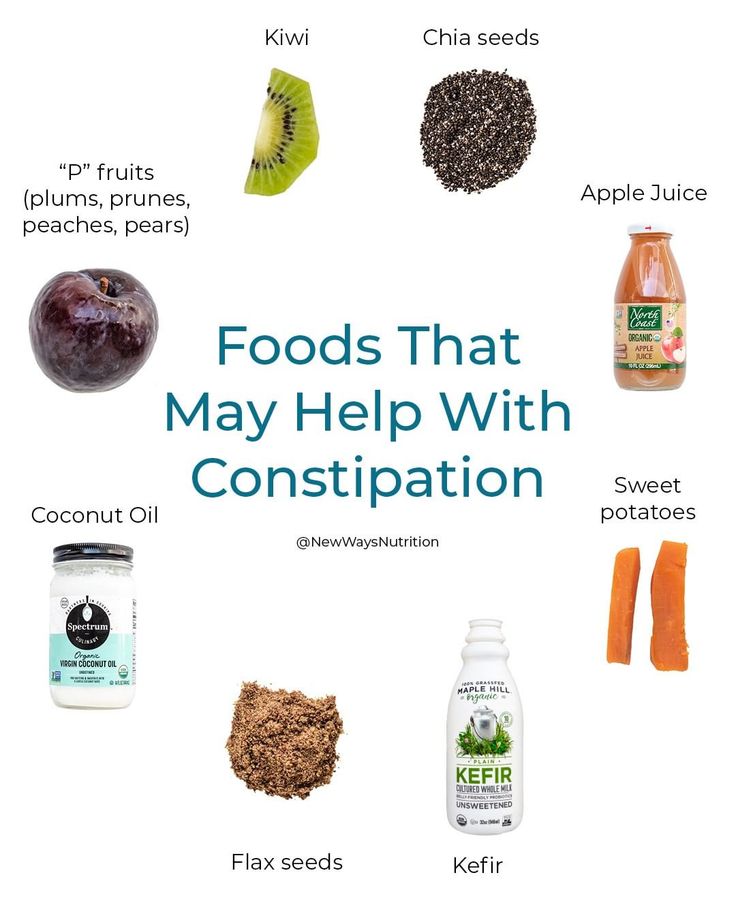 2014 Oct;40(7):750-8
2014 Oct;40(7):750-8 - Bae SH. Diets for constipation. Pediatr Gastroenterol Hepatol Nutr. 2014;17(4):203-208.
- Reiland H, Slavin J. Systematic Review of Pears and Health. Nutr Today. 2015;50(6):301-305. nine0348 Yang, Jing et al. “Effect of dietary fiber on constipation: a meta analysis.” World journal of gastroenterology vol. 18.48 (2012): 7378-83.
- Turan İ, Dedeli Ö, Bor S, İlter T. Effects of a kefir supplement on symptoms, colonic transit, and bowel satisfaction score in patients with chronic constipation: a pilot study. Turk J Gastroenterol. 2014;25(6):650-656.
- Alina Petre. 7 Foods That Can Cause Constipation. health line. 2020.
- Bujanda L. The effects of alcohol consumption upon the gastrointestinal tract. Am J Gastroenterol. 2000;95(12):3374-3382.
- Carroccio A, Iacono G. Review article: Chronic constipation and food hypersensitivity--an intriguing relationship.
